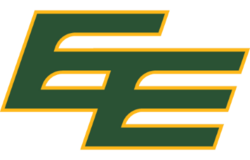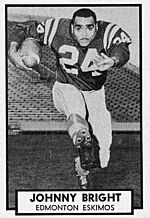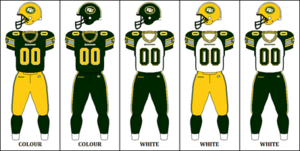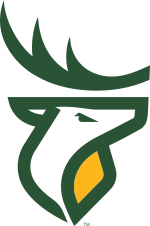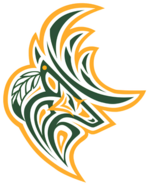Edmonton Elks facts for kids
The Edmonton Elks are a professional Canadian football team from Edmonton, Alberta. They play in the Canadian Football League (CFL) as part of the West Division. Their home games are held at Commonwealth Stadium. The team started in 1949 as the Edmonton Eskimos. They have won the Grey Cup championship 14 times, which is more than any other CFL team in Western Canada. This includes winning three times in a row from 1954 to 1956, and an amazing five times in a row from 1978 to 1982. Their most recent championship was in 2015. The Elks have a big rivalry with the Calgary Stampeders. The team stopped using the "Eskimos" name in 2020, and their new name, "Elks," was officially announced on June 1, 2021.
| Founded | 1949 |
|---|---|
| Based in | Edmonton, Alberta, Canada |
| Home field | PlayAlberta Field at Commonwealth Stadium |
| Head coach | Mark Kilam |
| General manager | Ed Hervey |
| Owner(s) | Larry Thompson |
| League | Canadian Football League |
| Division | West |
| Colours | Green, gold, white |
| Nickname(s) |
|
| Mascot(s) | Punter and Spike |
| Grey Cup wins | 14 (1954, 1955, 1956, 1975, 1978, 1979, 1980, 1981, 1982, 1987, 1993, 2003, 2005, 2015)
|
| Current uniform | |
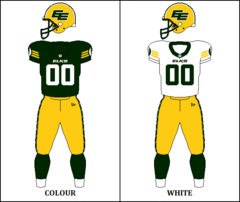 |
|
Contents
Who Owns the Edmonton Elks?
The Edmonton Elks were a "community owned" team from 1949 until the middle of the 2024 season. This means that many local people owned small parts of the team.
The team was managed by a board of ten directors. This board included a chairman, treasurer, secretary, and seven other directors. Chris Presson was the club's president and CEO until November 22, 2021.
In 2024, Larry Thompson, who was a long-time fan and part-owner, bought the entire team. He became the first single private owner in the club's history.
The History of Edmonton Football
Early Football Teams in Edmonton (1895–1939)
Before the current team, there was an older Canadian football and rugby union team called the Edmonton Rugby Foot-ball Club. They started playing organized games in 1895. In 1908, they began using the name Esquimaux. By 1910, they were officially called the Edmonton Eskimos. For a short time in 1922, they were even called the Edmonton Elks.
Other teams also represented Edmonton during this time, like the Edmonton Civics in 1914 and the Edmonton Canucks in 1919. The original Eskimos team played in the 9th Grey Cup and 10th Grey Cup games, being the first western teams to do so, but they lost both. The team stopped playing in 1925, came back for two seasons in 1928, and then stopped again.
Other teams followed, like the Edmonton Boosters and the Edmonton Hi-Grads in 1936. Top-level football returned to Edmonton in 1938 with a team again called the Eskimos. This team played in the Western Interprovincial Football Union (WIFU) but stopped after only two seasons because of the Second World War.
The Modern Team's Journey
The Edmonton Elks team we know today started in 1949. They were called the Edmonton Eskimos and played in the WIFU. Their first head coach was Annis Stukus, who has a CFL award named after him. The team played their home games at Clarke Stadium. They quickly became successful with quarterback Jackie Parker and running back Johnny Bright. They won the Grey Cup three years in a row from 1954 to 1956.
The team did not win the Grey Cup again until 1975, which was their longest time without a championship. In 1978, the team moved to Commonwealth Stadium.
The team then won five Grey Cups in a row (1978–1982). This amazing streak was led by star quarterbacks Warren Moon and Tom Wilkinson, and head coach Hugh Campbell. After a short break, Campbell returned to the team in 1986 and worked in management until he retired in 2006. This five-year winning period, along with the success of Edmonton's NHL team, the Edmonton Oilers, helped the city earn the nickname "City of Champions" in the 1980s. Edmonton played in nine Grey Cups in ten years, from 1973 to 1982.
In the 1980s and 90s, a key player was Gizmo Williams. He still holds many CFL records for returning punts and kickoffs. He was a big part of the Grey Cup wins in 1987 and 1993, under head coach Ron Lancaster. During this time, the team also had a very strong defense. Players like Danny Kepley and Danny Bass won Defensive Player of the Year awards. Willie Pless won this award a record five times.
After winning the Grey Cup in 2003 and 2005 with quarterback Ricky Ray, the team missed the playoffs the next year. This was the first time in 34 years, which was a record for professional sports in North America. This led to a ten-year period without a Grey Cup win. After this gap, Edmonton won the Grey Cup again in 2015, led by quarterback Mike Reilly. This is their most recent championship.
In 2020, some team sponsors, like Belairdirect and Boston Pizza, asked the team to change their name. The word Eskimo is considered an offensive term for Inuit people. So, on July 21, 2020, the team officially stopped using the word "Eskimo." The team temporarily changed its name to the "Edmonton Football Team" or "EE Football Team." They planned to choose a new nickname starting with "E" to keep some of their old branding, like the double-E logo. Many Indigenous groups, including the Inuit Tapiriit Kanatami, supported this change. On June 1, 2021, the team announced their new name would be the Edmonton Elks. This name was actually used by an Edmonton football club back in 1922.
Warren Moon, a famous player who led Edmonton to five straight Grey Cups (1978-1982), said that the name "Eskimos" meant pride and winning to him. However, he supported the change because he understood that some people might find the name offensive. He said, "If this is something that is insensitive to another group of people, that is something I can understand being a minority myself." This name change happened around the same time that the Washington Redskins in the National Football League became the Washington Commanders, and the Cleveland Indians in Major League Baseball became the Cleveland Guardians.
Team Colors and Logos
The team's colors, green and gold, have mostly stayed the same over the years. There were only small changes to the uniform or logo until 2021. In 2021, the EE logo became a secondary logo, and a new logo of a stylized elk was introduced. The Elks helmet logo was also changed to antlers. After using the elk-antler helmet for the 2021 season, the team brought back the EE logo to their helmets in 2022. Fans really liked the EE logo, so it returned.
In 2021, the Elks worked with Izaiah Masuskapoe, an Indigenous student, to create a special logo. This logo celebrates Indigenous people in Edmonton. In 2024, the CFL used similar logos across Canada to mark the National Day of Truth and Reconciliation. The BC Lions had done something similar a few months before.
After the team got a new private owner, the EE logo became the main logo again in 2025. The elk logo is now used as a secondary logo.
Team Records and Achievements
The Edmonton Elks have won the Grey Cup 14 times. This is more than any team except the Toronto Argonauts, who have 18 wins. Since the CFL started in the 1950s, Edmonton has won more championships than any other team.
The Elks hold several CFL records:
- Most consecutive Grey Cup wins: 5 (1978–1982)
- Most consecutive Grey Cup appearances: 6 (1977–1982)
- Most consecutive playoff appearances: 34 (1972–2005)
- Most consecutive first-place finishes in their division: 6 (1977–1982)
- Most consecutive home playoff victories: 12 (1973–1987)
- Most consecutive seasons with a winning record (above .500): 14 (1984–1997)
- Most consecutive seasons with 10 or more wins: 13 (1985–1997)
- Most wins in a season: 16 (1989)
- Highest winning percentage in a season (minimum 16 games): 0.906 (1981)
- Most games above .500 in a season: 14 (1989)
- Most home wins in a season: 9 (1989)
- Most consecutive seasons with a .500 or better record: 27 (1972–1998)
- Longest consecutive home losing streak: 22 games (October 26, 2019 – August 10, 2023)
- Longest consecutive winless home streak: 22 games (October 26, 2019 – August 10, 2023)
The team holds two opposite North American professional sports records. They made the playoffs for 34 years in a row (1972–2005), showing great success. On the other hand, they also hold the record for the longest home losing streak and winless streak, which reached 22 games. These streaks ended on August 27, 2023, when they won their first home game under the Elks name. The previous record for a home losing streak was held by the 1953 St. Louis Browns.
The Elks have often had the highest average attendance in the CFL. Since moving to Commonwealth Stadium in 1978, they have led the league in attendance 27 times.
Many former Elks players have become important figures in Alberta politics. These include two former provincial premiers (Peter Lougheed and Donald Getty), a former mayor of Edmonton (Bill Smith), and a lieutenant-governor (Norman Kwong). Other famous athletes who played for the Elks include professional wrestler and WWE champion Roman Reigns, who played under his birthname Joe Anoa'i in 2008.
Wall of Honour
The Edmonton Elks celebrate players who have played exceptionally well for the team. The names, numbers, and years played for the Elks are shown on the edge of the stadium at Commonwealth Stadium. The Elks usually keep most jersey numbers in use. However, the numbers of Warren Moon (1), Don Warrington (21), and Rollie Miles (98) have been retired and are no longer given to new players.
Numbers Honored (as of 2023):
- 1 Warren Moon (2001)
- 2 Henry "Gizmo" Williams (2002)
- 3 Terry Vaughn (2023)
- 11
 Sean Fleming (2011)
Sean Fleming (2011) - 12 Tom Wilkinson (1982)
- 13 Larry Highbaugh (1996)
- 14
 Oscar Kruger (1992)
Oscar Kruger (1992) - 15 Ricky Ray (2019)
- 22 Tom Scott (1993)
- 24 Johnny Bright (1983)
- 24 Ed Jones (2022)
- 25 Jim Germany (2022)
- 26
 Dave Cutler (1986)
Dave Cutler (1986) - 27
 Don Getty (1992)
Don Getty (1992) - 29 Joe Hollimon (2022)
- 30 Danny Bass (1992)
- 39 Willie Pless (2004)
- 42 Danny Kepley (1987)
- 47
 Larry Wruck (2011)
Larry Wruck (2011) - 51 Frank "Guts" Anderson (1985)
- 53
 Frank Morris (1984)
Frank Morris (1984) - 55 Ron Estay (2010)
- 60
 Chris Morris (2008)
Chris Morris (2008) - 62
 Bill Stevenson (2014)
Bill Stevenson (2014) - 63
 Hector Pothier (2014)
Hector Pothier (2014) - 65
 Dave Fennell (1984)
Dave Fennell (1984) - 66 Roger Nelson (1987)
- 66 John LaGrone (1988)
- 67
 Rod Connop (2005)
Rod Connop (2005) - 70 Brian Kelly (1989)
- 76 George McGowan (1985)
- 77
 Tommy Joe Coffey (1988)
Tommy Joe Coffey (1988) - 91 Jackie Parker (1983)
- 95
 Norman Kwong (1984)
Norman Kwong (1984) - 98 Rollie Miles (1983)
Current Team Roster
Quarterbacks
Running backs
Receivers
|
Offensive linemen
Defensive linemen
|
Linebackers
Defensive backs
Special teams
|
Pending Free Agents
Suspended
|
||||||||
| Italics indicate American player • Bold indicates Global player • 45 Active, 21 Injured, 9 Practice, 13 Rookies, 5 Suspended Roster updated 2022-10-22 • Depth chart • Transactions • More CFL rosters |
|||||||||||
Current Coaching Staff
Front Office
Head Coach
Offensive coaches
|
Defensive coaches
Special teams coaches
Strength and Conditioning
→ Coaching staff |
|||||
Head Coaches Through the Years
 Annis Stukus (1949–1952)
Annis Stukus (1949–1952)- Frank Filchock (1952)
- Darrell Royal (1953)
- Pop Ivy (1954–1957)
- Sam Lyle (1958)
- Eagle Keys (1959–1963)
- Neill Armstrong (1964–1969)
- Ray Jauch (1970–1976)
- Hugh Campbell (1977–1982)
- Pete Kettela (1983)
- Jackie Parker (1983–1987)
- Joe Faragalli (1987–1990)
- Ron Lancaster (1991–1997)
- Kay Stephenson (1998)
- Don Matthews (1999–2000)
- Tom Higgins (2001–2004)
 Danny Maciocia (2005–2008)
Danny Maciocia (2005–2008)- Richie Hall (2009–2010)
- Kavis Reed (2011–2013)
- Chris Jones (2014–2015)
- Jason Maas (2016–2019)
- Scott Milanovich (2020)
 Jaime Elizondo (2021)
Jaime Elizondo (2021)- Chris Jones (2022–2024)
- Jarious Jackson (2024)
 Mark Kilam (2025–present)
Mark Kilam (2025–present)
General Managers Through the Years
- Al Anderson (1949–1956)
- Keith Rolfe (1957–1960)
- Joe Ryan (1960–1965)
- Vic Schwenk (1966)
- Norm Kimball (1966–1985)
- Hugh Campbell (1986–1996)
- Tom Higgins (1997–2004)
- Paul Jones (2005–2007)
- Danny Maciocia (2008–2010)
- Eric Tillman (2010–2012)
- Ed Hervey (2013–2016)
- Brock Sunderland (2017–2021)
- Chris Jones (2022–2024)
- Geroy Simon (2024)
- Ed Hervey (2025–present)
CFL Awards and Trophies Won by Elks
- 1954, 1955, 1956, 1975, 1978, 1979, 1980, 1981, 1982, 1987, 1993, 2003, 2005, 2015
N. J. Taylor Trophy
- 1952, 1954, 1955, 1956, 1960, 1973, 1974, 1975, 1977, 1978, 1979, 1980, 1981, 1982, 1986, 1987, 1990, 1993, 1996, 2002, 2003
Grey Cup MVP
- Dave Fennell (DT): 1978, 1982
- Tom Wilkinson (QB): 1978
- Warren Moon (QB): 1980, 1982
- Dale Potter (LB): 1980
- Damon Allen (QB): 1987, 1993
- Stewart Hill (DE): 1987
- Jason Tucker (WR): 2003
- Ricky Ray (QB): 2005
- Mike Reilly (QB): 2015
Dick Suderman Trophy
- Garry Lefebvre (DB): 1973
- Dave Cutler (K): 1975
- Angelo Santucci (RB): 1978
- Dale Potter (LB): 1980
- Neil Lumsden (RB): 1981
- Dave Fennell (DT): 1982
- Milson Jones (RB): 1987
- Sean Fleming (P/K): 1993
- Mike Maurer (FB): 2005
- Shamawd Chambers (WR): 2015
- Billy Vessels (RB): 1953
- Jackie Parker (QB/RB): 1957, 1958, 1960
- Johnny Bright (RB): 1959
- George McGowan (WR): 1973
- Tom Wilkinson (QB): 1974
- Warren Moon (QB): 1983
- Tracy Ham (QB): 1989
- Mike Reilly (QB): 2017
Most Outstanding Canadian Award
- Norman Kwong (RB): 1955, 1956
- Dave Fennell (DT): 1979
- Blake Marshall (FB): 1991
- Leroy Blugh (DE): 1996
- Kamau Peterson (WR): 2008
- Jerome Messam (RB): 2011
Most Outstanding Defensive Player Award
- Danny Kepley (LB): 1977, 1980, 1981
- Dave Fennell (DT): 1978
- James Parker (LB): 1982
- Danny Bass (LB): 1989
- Willie Pless (LB): 1992, 1994, 1995, 1996, 1997
- Elfrid Payton (DE): 2002
- J. C. Sherritt (LB): 2012
Most Outstanding Offensive Lineman Award
- Charlie Turner (OT): 1975
- Michael Wilson (OT): 1979, 1980
- Rod Connop (C): 1989
Most Outstanding Lineman Award
- Roger Nelson (OT): 1959
- John LaGrone (DT): 1969
Most Outstanding Rookie Award
- Brian Kelly (WR): 1979
- Shalon Baker (WR): 1995
- Dexter McCoil (LB): 2014
- Derel Walker (WR): 2015
Annis Stukus Trophy
- Ray Jauch: 1970
- Hugh Campbell: 1979
- Ron Lancaster: 1996
- Tom Higgins: 2003
Tom Pate Memorial Award
- David Boone (DE): 1982
- Hector Pothier (OT): 1988
- Rick Walters (SB): 2001
- Adarius Bowman (WR): 2017
- Ryan King (LS): 2018
Rogers Fans' Choice Award
- Ricky Ray (QB): 2003
Team Mascots
The Edmonton Elks have two mascots: Punter and Spike. Punter is a football character, and Spike is an elk. Punter was introduced in 2004, and Spike joined in 2021. Before Spike, the team had a polar bear mascot named Nanook, who was introduced in 1997 but retired when the team rebranded in 2021.
Season Results
For a detailed look at how the Edmonton Elks have performed each season, you can visit: List of Edmonton Elks seasons
Learn More
- Edmonton Elks all-time records and statistics
- Canadian Football Hall of Fame
- Canadian football
- Comparison of Canadian and American football
- List of Canadian Football League seasons
See also
 In Spanish: Edmonton Elks para niños
In Spanish: Edmonton Elks para niños
 | James B. Knighten |
 | Azellia White |
 | Willa Brown |


